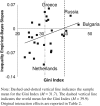Individual Differences in the Resistance to Social Change and Acceptance of Inequality Predict System Legitimacy Differently Depending on the Social Structure
- PMID: 28706346
- PMCID: PMC5485172
- DOI: 10.1002/per.2100
Individual Differences in the Resistance to Social Change and Acceptance of Inequality Predict System Legitimacy Differently Depending on the Social Structure
Abstract
We propose that individual differences in the resistance to social change and the acceptance of inequality can have divergent effects on legitimacy depending on the context. This possibility was tested in a sample of 27 European countries (N = 144 367) and across four experiments (total N = 475). Individual differences in the resistance to social change were related to higher levels of perceived legitimacy no matter the level of inequality of the society. Conversely, individual differences in the acceptance of inequality were related to higher levels of perceived legitimacy in unequal societies, but either a relationship near zero or the opposite relationship was found in more equal societies. These studies highlight the importance of distinguishing between individual differences that make up political ideology, especially when making predictions in diverse settings. © 2017 The Authors. European Journal of Personality published by John Wiley & Sons Ltd on behalf of European Association of Personality Psychology.
Keywords: inequality; legitimacy; political psychology; social structure.
Figures



Similar articles
-
On Self-Love and Outgroup Hate: Opposite Effects of Narcissism on Prejudice via Social Dominance Orientation and Right-Wing Authoritarianism.Eur J Pers. 2017 Jul-Aug;31(4):366-384. doi: 10.1002/per.2114. Epub 2017 Aug 4. Eur J Pers. 2017. PMID: 28983151 Free PMC article.
-
Resource availability and adjustment of social behaviour influence patterns of inequality and productivity across societies.PeerJ. 2018 Oct 2;6:e5488. doi: 10.7717/peerj.5488. eCollection 2018. PeerJ. 2018. PMID: 30310732 Free PMC article.
-
Is higher inequality less legitimate? Depends on How You Frame it!Br J Soc Psychol. 2017 Dec;56(4):766-781. doi: 10.1111/bjso.12202. Epub 2017 May 25. Br J Soc Psychol. 2017. PMID: 28547801
-
Political conservatism as motivated social cognition.Psychol Bull. 2003 May;129(3):339-75. doi: 10.1037/0033-2909.129.3.339. Psychol Bull. 2003. PMID: 12784934 Review.
-
Income inequality, social cohesion and the health status of populations: the role of neo-liberalism.Soc Sci Med. 2000 Jul;51(1):135-46. doi: 10.1016/s0277-9536(99)00445-1. Soc Sci Med. 2000. PMID: 10817476 Review.
Cited by
-
The immorality of too much money.PNAS Nexus. 2025 Jun 24;4(6):pgaf158. doi: 10.1093/pnasnexus/pgaf158. eCollection 2025 Jun. PNAS Nexus. 2025. PMID: 40575707 Free PMC article.
-
Social Dominance Orientation Boosts Collective Action Among Low-Status Groups.Front Psychol. 2021 Jun 11;12:681302. doi: 10.3389/fpsyg.2021.681302. eCollection 2021. Front Psychol. 2021. PMID: 34177735 Free PMC article.
-
The Evolution of Social Beliefs 1960-2016 in the United States and Its Influence on Empathy and Prosocial Expression in Medicine.Adv Med Educ Pract. 2020 Jun 29;11:437-446. doi: 10.2147/AMEP.S246658. eCollection 2020. Adv Med Educ Pract. 2020. PMID: 32636695 Free PMC article.
References
-
- Brandt, M. J. (2013). Do the disadvantaged legitimize the social system? A large‐scale test of the status‐legitimacy hypothesis. Journal of Personality and Social Psychology, 104, 765–785. - PubMed
-
- Brandt, M. J. , Reyna, C. , Chambers, J. , Crawford, J. , & Wetherell, G. (2014). The ideological‐conflict hypothesis: Intolerance among both liberals and conservatives. Current Directions in Psychological Science.
-
- Brandt, M. J. , & Henry, P. J. (2012). Gender inequality and gender differences in authoritarianism. Personality and Social Psychology Bulletin, 38, 1301–1315. - PubMed
-
- CIA . (2013). CIA World Factbook February 14, 2013, from https://www.cia.gov/library/publications/the‐world‐factbook/fields/2172....
LinkOut - more resources
Full Text Sources
Other Literature Sources
